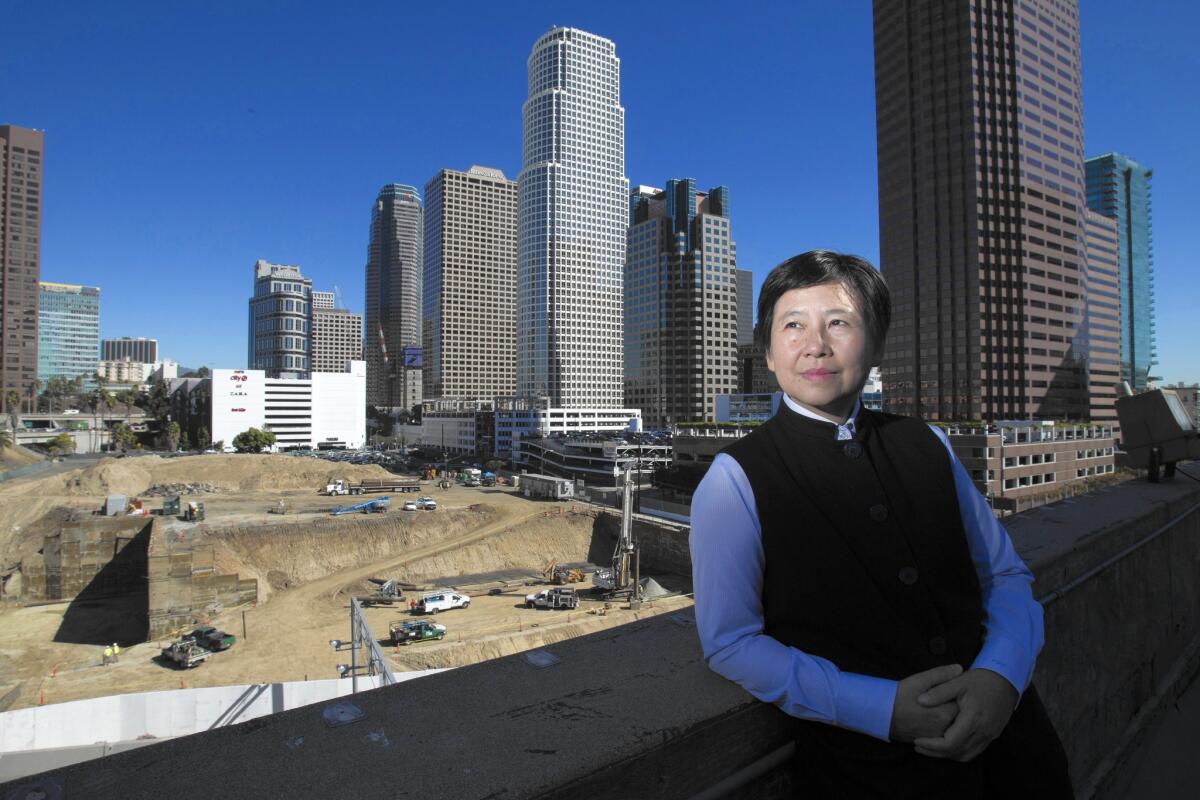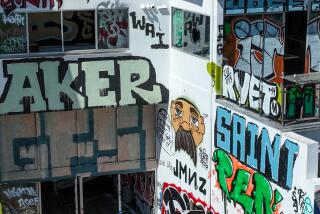Chinese developer leads transformation of L.A.’s skyline

“Downtown is undergoing a tremendous change that is so exciting,” says I Fei Chang.
For decades, the sprawling six-acre Metropolis parcel in downtown Los Angeles sat barren as successive real estate busts derailed the promise of a $1-billion “city within a city.”
Now, in an eye-rubbing spectacle, three towering cranes are working on the first phase of a hotel and a condominium tower, while construction has begun on two more condo towers for the second phase.
With the economy accelerating, the pledge made in the 1980s is finally being fulfilled by a feisty developer from China who is leading the transformation of downtown’s skyline.
As chief executive of Chinese development firm Greenland USA, I Fei Chang is overseeing $6 billion worth of real estate development in the U.S., making her one of the biggest developers in the country.
“I don’t know of another woman in the country who is managing $6 billion in assets,” said Carol Schatz, president of the Central City Assn. of Los Angeles, a business advocacy group. “I Fei Chang is an extraordinary woman doing what traditionally has been a man’s job in a male-dominated culture.”
Chang, a Taiwan native and a Yale grad, takes pride in her ability to move quickly. “She understands America just enough, but has the Chinese bravado,” architect Rob Jernigan said. “She is a dynamo.”
Last year, at the groundbreaking ceremony for her company’s $1-billion Metropolis hotel, condominium and shopping complex, she boldly declared that the four enormous buildings would go up “fast.” It was a promise that some developers dismissed as the naive statement of a newcomer unfamiliar with America’s dreaded permitting process.
All four buildings along the 110 Freeway north of L.A. Live are expected to be completed in 2018.
One of her first tasks for Metropolis was to whip designs out of Jernigan’s architecture firm, Gensler, one of the biggest in the world.
“She would come to our offices on Sunday and say, ‘Where is everybody, why are you not working on my project?’” Jernigan recalled. “We said, ‘It’s Sunday.’ And she said, ‘OK ... Why are you not working on my project?’”
Jernigan would often encounter Chang in Gensler’s L.A. office quietly at work with his team, red-marking a set of plans and making changes. She has a bachelor’s degree in architecture and started her career as an architect in Japan during its last real estate boom.
She returned to her native Taiwan to work as a developer, convinced she could become an innovator “with my Taiwan cultural roots and my American free mind,” she said.
Chang’s portfolio includes a $4-billion master-planned community in St. Petersburg, Russia, for Greenland Group. Chang also helped develop large-scale projects on virgin land in China before Greenland Chairman Zhang Yuliang selected her to helm Metropolis and an even larger mixed-use project in New York as the company took a big leap into the U.S. real estate market.
“Metropolis was a major hole in the ground for over 25 years, reflecting the decline of downtown over the decades,” Schatz said. “The Greenland project is a perfect symbol of downtown’s emergence as a world-class city center.”
Supervising two large-scale developments keeps Chang on the move between both coasts, with occasional visits to headquarters in China and to see her parents in Taiwan. She takes them on holidays, carrying their luggage as a sign of respect.
Being constantly on the move is part of being deeply inquisitive, Chang said. As a small child she would sit up on her knees to look out the window of her parents’ car.
“I loved to observe people ... and also observe the buildings,” she said.
In Los Angeles, she lives in a rented apartment near Greenland’s offices in a high-rise office tower overlooking the Metropolis site. Every day she walks a different route to work.
“I am just curious,” she said. “Downtown is undergoing a tremendous change that is so exciting.”
Chang believes developers and leaders should act while the momentum is strong.
“We need to bring in more believers and really move city development and create more jobs,” she said.
The 6.3-acre Metropolis parcel was assembled in the late 1980s. The office, hotel and retail project was designed by famed New York architect Michael Graves in his signature postmodern style that included covering the buildings in brightly colored terra-cotta tiles.
An economic downturn in the 1990s stalled the project, and in the mid-2000s another developer took over and secured city approval for a new design closer to the current project. Another real estate downturn hit, and the developers sold the site to Greenland for nearly $150 million last year.
Chang’s team started excavating the site last July and has kept on schedule since, she said. The three cranes working on the hotel and condo tower are an unusual sight in Los Angeles, where one crane per building is typical.
“We added a second crane to the residential tower to ensure timely progress,” Chang said.
Developers usually wait for condos to be sold before erecting more, but Chang is already at work on the second phase of Metropolis — two more high-rise condo towers with about 1,500 units.
The first phase will include an 18-story, 350-room hotel and a 38-story condo tower with 308 units. More than half of the condos have committed buyers, Chang said.
Chang is sensitive to American concerns about whether Chinese investors have U.S. interests at heart for the long term.
“We have to be very cautious to help the city economic growth in a very sustainable way,” she said.
Chinese development appears to differ from the heavy Japanese investment in U.S. real estate in the late 1980s, which unnerved many Americans. Japanese investors acquired prominent properties at record prices before both countries experienced an economic downturn in the early 1990s and their real estate markets crashed.
Greenland and other Chinese developers in Los Angeles are building new projects from the ground up, assuming substantial financial risk. If they fail to turn a profit, developments such as Metropolis could be sold for less than it cost to build them.
Greenland is also working with city officials and business leaders to create Avenue of the Angels, a proposed pedestrian thoroughfare with shops, restaurants and bars intended to link downtown’s South Park neighborhood with the financial district. It would pass by Metropolis.
A wave of Chinese investors such as Chang are heading to the U.S. to find opportunities, real estate attorney Jim Butler said.
“Chinese investors will become even more active and influential over the next 10 years,” he said, “and will continue adapting to Western business practices while retaining a critical sensitivity to their Chinese roots and the demographics of the Chinese population in the United States.”
Chang “is a very colorful character,” architect Jernigan said.
“She is fair but demanding — fair in the way she defines fair,” he said. “We don’t even dream of missing deadlines.”
Twitter: @rogervincent
More to Read
Inside the business of entertainment
The Wide Shot brings you news, analysis and insights on everything from streaming wars to production — and what it all means for the future.
You may occasionally receive promotional content from the Los Angeles Times.











